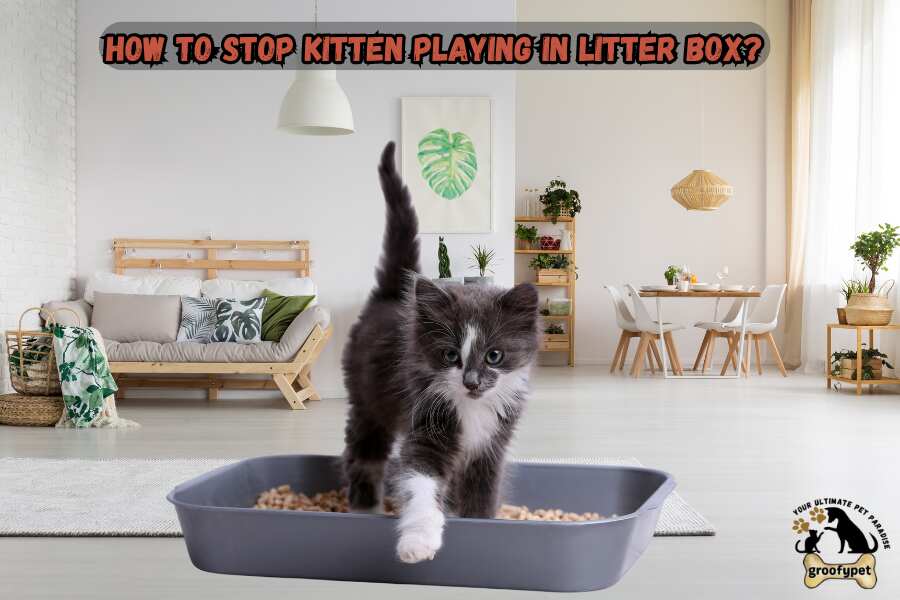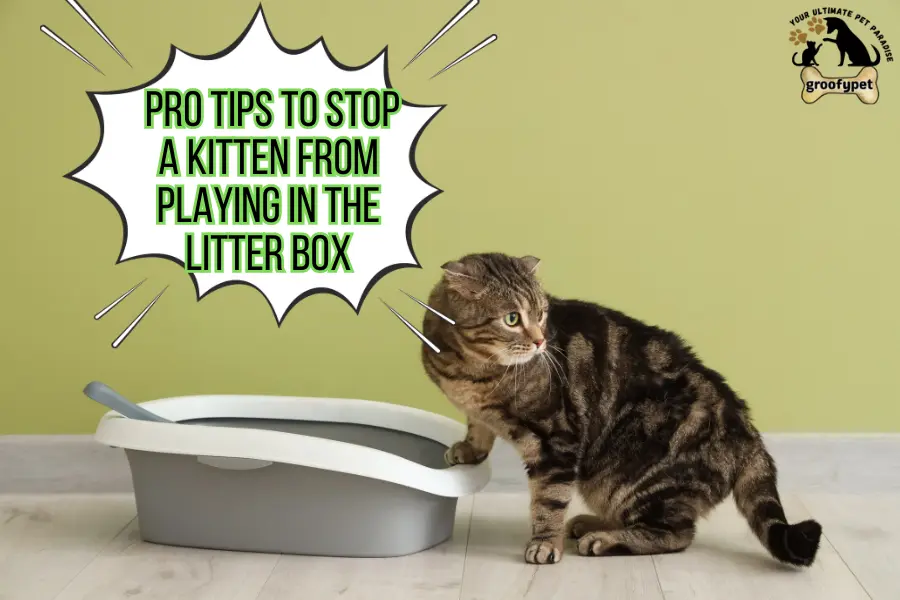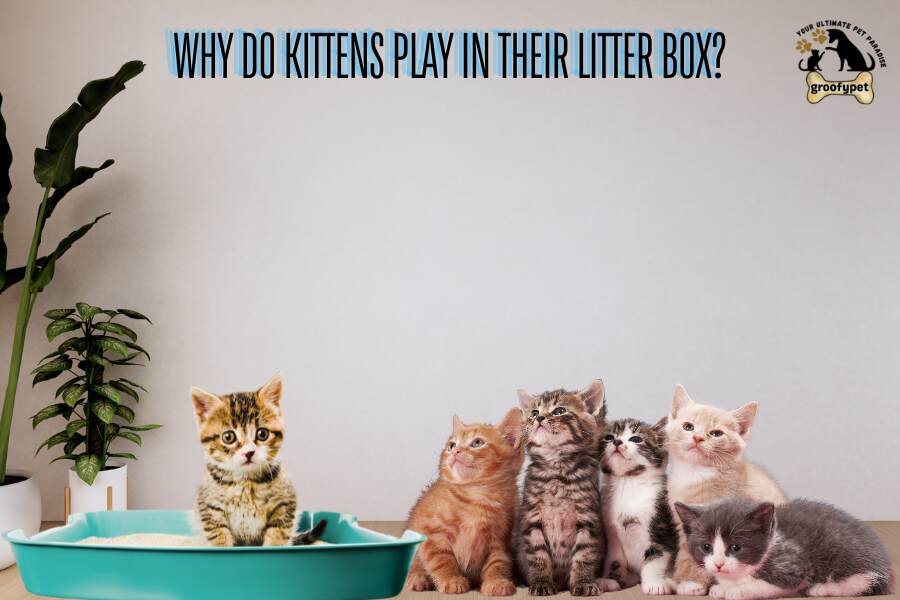
How to Stop Kitten Playing in Litter Box? When you notice your kitten playing in the litter-box, it’s easy to become concerned. This behavior might seem odd but is quite normal for felines as they explore their playground. However, it’s important to address this concern because frolicking in the litter-box can be a sign of something that needs attention.
Your kitty is simply learning skills and habits by exploring different places, which include the bathroom area. Sometimes, they see it as a unique playground, but with a bit of guidance, this can be redirected stop your kitten from using the litter-box as a playground, consider setting up regular breaks and playtime with interactive toys that stimulate their curiosity and energy.
Providing alternative toys and products that are self-cleaning and engaging will help shift their attention from the box. They can help you address any underlying issues and suggest the best ways to make your feline friend’s playtime enjoyable and appropriate.
Table of Contents
ToggleHow to stop kitten playing in litter box. Is It Normal?
Kittens often play in their litter boxes as part of their natural development, helping them learn skills like hunting and digging. This behavior is normal and usually not a cause for concern. However, if the play seems excessive or is accompanied by stress or health issues, it may need further investigation.
Kittens have a strong instinctive urge to explore and play, and this often leads them to the litter-box. This behavior is a part of their natural development, helping them learn essential life skills like hunting and digging. Kittens enjoy scratching and pouncing in their litter boxes, using it as a playground to develop their skill and engage in normal behavior.
Although it might be surprising to see your young cat having so much fun in the litter-box, it is generally normal and not a cause for worry. They are simply expressing their natural playmates and feet-based instincts. However, if your kitten’s play seems excessive or if you notice signs of stress or anxiety, or if it is accompanied by medical issues, it might be worth investigating further. Older cats usually don’t exhibit this behavior as prominently, so it’s more common in young cats.
Kittens often enjoy playing in their litter boxes because they are still learning and developing their life skills. This habit can be common, especially in young kittens who are just starting to figure out their environment. Spending time with them and providing older cats to model behavior can help redirect their playfulness. Ensure that stress levels are low and check for any medical issues that might be influencing their actions. Keeping the litter box clean and offering alternative play areas can also assist in breaking this habit.- Kittens are developing their life skills and may play in the litter box as part of this learning process.
- Older cats can serve as role models to guide kittens towards more appropriate behavior.
- Ensure that the litter box is kept clean to reduce any stress related to its use.
- Monitor for medical issues that might be affecting your kitten’s behavior.
- Provide alternative play areas to help kittens divert their attention from the litter box.
Pro Tips to Stop a Kitten from Playing in Litter Box

Certainly! Here are some pro tips to stop a kitten from playing in the litter box:
1. Selecting the proper sort of Litter Box
Size and Depth: Make sure that the litter box is of the right size, too. A deep box may limit the amount of litter that the kitten can kick out whenever the kitten is at play.
Covered Box: To avoid making its play area look like that of a litter box, make it a covered litter box.
2. Select the Right Litter
Texture Matters: Try other Litter types with different feels; there is pellet-like style litter that may not interest the cat for play.
Dust-Free Options: Select the dust free litter because it will fit on the litter box and may cause less mess and health problems in the house.
3. Limit Access
Supervised Visits: Observe your kitten’s behavior when it is in the litter box and train it not to play with the litter if it starts.
Restrict Access: Do not allow your cat to have free Access to the litter box when you and your kids are playing, for instance, or when there are guests around.
4. Provide Alternative Play Options
Interactive Toys: Provide many enrichments like balls, feather wands, and toys that can easily capture their energy from the litter box.
Designated Play Areas: Built a favorable environment for their play by providing them with toys, tunnels, and scratching posts that are appropriate for them to use.
5. Establish a Routine
Scheduled Playtime: Through play, your kitten becomes engaged, an effective tool that can enable the owner to tire it up, thus eliminating the need for litter box play.
Meal Times: After feeding the kitten, take it to the litter box, and after it is done, lead it to another area where it cannot relieve itself.
6. Regular Cleaning
Frequent Scooping: Especially don’t allow the cat to play with the litter to reduce this habit by ensuring you always clean it. In this context, it is easy to concretize, and a clean box is less likely to be mistaken for a sandbox.
Multiple Litter Boxes: If you own many cats, make sure they have many litter boxes so that they would not compete with each other and maybe play instead.
7. Positive Reinforcement
Reward Proper Behavior: You should always make a point of praising your kitten and or rewarding him for being good in the litter box and not playing around inside it.
Ignore Playful Behavior in the Box: Of course, one should not reinforce this behavior and in this case, it is best not to attend to the cat when it plays in the litter box.
With the help of these tips, the kitten gets accustomed to using the litter box, and you minimize their desire actually to play in it.
Why Do Kittens Play in Their Litter Box?
Kittens often find their litter box to be a playful area, and it’s surprising to see them treat it like a game. One of the reasons they do this is that they enjoy hiding, pouncing, and playing in their litter tray.

It’s like a mini-adventure for them, making it difficult to get them to play elsewhere. If they’re struggling to find other boxes or playmates, they might just see the litter box as a fun place to spend their time.
To encourage better behavior, make sure the litter box is always clean and reach-able, and offer plenty of toys and interactive games to distract them. By providing an attractive alternative, you can help redirect their play instincts from the wrong place.
How to Stop Kitten Playing in Litter Box? Reasons
There are also several other reasons why your cat might be spending more time in its litter box than usual.
1.It might be medical issues
It is critical to recognize that this lighthearted conduct might occasionally be a symptom of a deeper problem. For example, if your cat takes too much time in the box, it could be related to stress or a medical condition.
Regular visits to the veterinarians can help out potential difficulties such as urinary problems, thyroid problem, or even high blood pressure. Have you ever noticed a sudden change in your feline’s behavior? It might be a good idea for scheduling a checkup.
2.It might be due to Stress and Anxiety
Kittens can often be seen playing in the litter tray, which might look cute but may indicate stress or anxiety. Feline friends are sensitive to changes within their surroundings, such as changing to a new home or welcoming a new family member.
Unexpected changes can disrupt their habit, prompting them to withdraw to the litter box. To create a calm atmosphere, place the litter box in a quiet quiet area of the house, away from noise and distractions. Provide enrichment and toys to keep your cat from using the litter box as a playground. You can encourage your cat to play in the litter box by making the environment relaxed.
3.Understanding Your Cat’s Litter Box Behavior: Curiosity and Playfulness
Kittens are naturally curious and often see the litter box as a new playground. Their instinct to explore and playful nature lead them to jump, roll, and paw around in the litter, turning it into a normal part of their development. While this behavior is normal, it can create a dirty environment, increasing the risk of infections and diseases.
Ensuring the litter box is clean and introducing proper bathroom habits can help manage this frequent occurrence. It’s essential to understand this behavior as a natural part of their learning world, rather than simply a nuisance.
4.Understanding Your Cat’s Needs
When it comes to keeping your kitten from playing in the litterbox, understanding their needs is crucial. Kittens often engage in this behavior due to curiosity or specific needs that might not be met. Professional advice can be invaluable here, as a team of experts can help identify any health issues or preferences your pet might have.
A happy and healthy kitten is less likely to use the litterbox for play. It’s essential to ensure their environment meets all their needs to prevent this behavior. Scheduling an appointment with a professional like Chelsea or Heart can provide tailored advice and solutions to keep your kitten content and focused on appropriate play.
5.Adjusting to Sudden Routine Changes
When you change your kitten’s routine, it can be a bit confusing for them. For instance, if you move their litter box to a new spot or switch to a new litter with a different scented or texturally different feel, it can create confusion. This may make the litter box seem more like a play area than a toilet. To prevent this, make sure to gradually introduce any new elements.
Start by mixing a bit of the old litter with the new to create a familiar ratio and reduce the confusion. If you’ve already made the change, try to adjust things back to their previous state and gradually transition over a few days. This method helps kittens adjust more smoothly and can prevent them from seeing the box as a play area.
How to Stop a Kitten from Playing in Their Litter Box? pro Tips!
- Provide toys to keep your kitten engaged. Ensuring they have multiple toys will help divert their attention from the litter box.
- Hide the litter box or place it in a less accessible area if your kitten continues playing in it. You might also try using cardboard or other similar items to contain the box and make it less inviting for playing.
- Clean the litter box frequently and use a covered box to make it less appealing for playing. Ensure that it is cleaned regularly to avoid any unpleasant odors.
- If your kitten displays difficulty or seems ill, such as showing signs of diarrhea or urinating problems, it might be a sign of a health issue. In such cases, consult a veterinarian to rule out any underlying conditions.
- Inhibit playing by making the litter box less engaging. Use unscented clay or clumping litter to reduce the urge to play. You can also try calming pheromone diffusers or plug-in pheromone products to reduce stress.
- Distract your kitten with treats and toys during playtime to shift their focus away from the box. Shouting or using fear as a tactic is not recommended as it can lead to stressed behavior and disrupt their learning process.
Frequently Asked Questions
How do I get my kitten to stop sitting in the litter box?
If your kitty is having too much fun in the litter box, provide new toys and exclusive time outside the box. Blocking access when not in use and purchasing engaging pet toys can redirect their instincts. Ensuring the litter box is clean and offering ample playtime outside the box will help satisfy their curiosity and keep them from playing in the litter box.
How to get your cat to stop rolling in the litter box?
To discourage your feline from rolling in the litter box, switch to a type of litter with a texture your cat doesn’t like. Owners should make changes in the box setup and keep it clean to avoid this behavior. If your cat plays in the box, adjusting the litter texture may help.
How to train your cat to avoid the litter box for playtime?
If you want to stop your kitten from playing in the litter box, take your cat to a new spot or piece of furniture for fun. Continue to redirect them outside or to a designated play area for several days after meals. Ensure the litter box is kept clean and is only used for its previous purpose to avoid any confusion.
Final Thoughts
This playing behavior in the litterbox is quite normal and is often a part of a kitten’s curious and playful nature. However, it can sometimes be a signal of underlying issues. Keeping an eye on this behavior and maintaining a clean, stimulating environment are essential steps in ensuring your kitten’s well-being.
Why Cat Pee on Clothes?Alarming Truth Behind this Behavior!
How to Get Rid of Ammonia Smell in Litter Box? 10 Powerful Tips!



